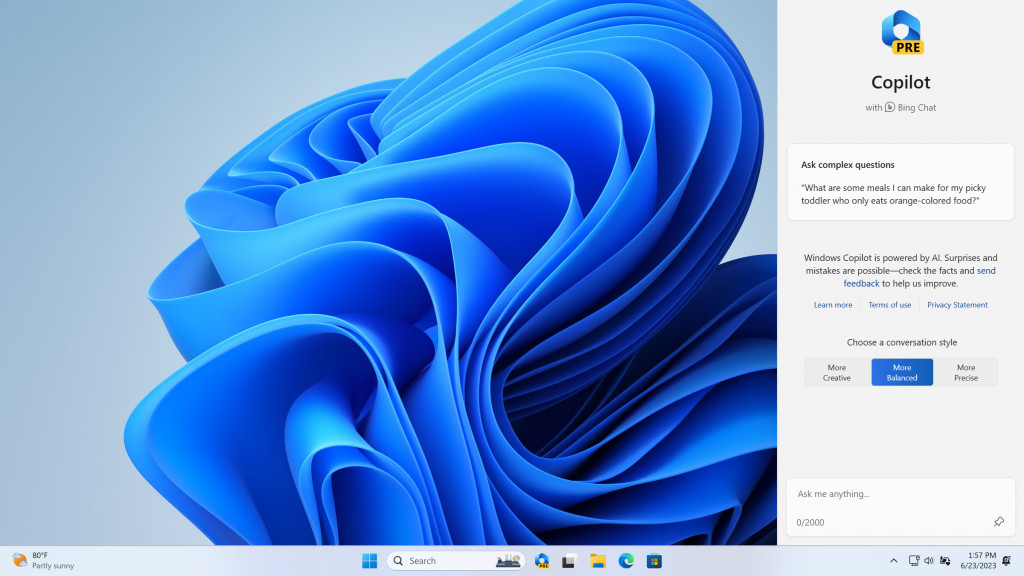Windows 11 gets Copilot AI – but Microsoft might be ruining it already
AI is now in testing, but with adverts piped through as ‘inline recommendations’ – argh...

Windows 11 has witnessed the arrival of Microsoft’s Copilot in testing, representing the first taste the public is getting of the AI assistant.
Microsoft promised Copilot would be out in June when the assistant was announced in May (at Build), and true to its word, the AI is present in the freshly revealed preview build 23493 in the Dev channel.
There are catches here, though, as you might imagine. For starters, this is a ‘controlled feature rollout’ meaning that only a small subset of users will get Copilot to begin with, and Microsoft will open it up to more testers over time.
In the blog post for build 23493, Microsoft tells us: “This first preview focuses on our integrated UI experience, with additional functionality coming down the road in future previews.”
Translation? Here’s Copilot but it’s mostly about how the interface works to begin with, rather than actual features and content. Of course, there is some functionality in this “early look” (as Microsoft calls it) at the AI.
You can ask Copilot to do the standard Bing AI stuff (compose a picture, or a piece of writing), summarize a website (in Edge), and the AI has some basics for Windows 11 controls and options, too.
The examples Microsoft gives are asking to turn on Dark Mode or Do Not Disturb, and also instructing Copilot to take a screenshot.
Get daily insight, inspiration and deals in your inbox
Sign up for breaking news, reviews, opinion, top tech deals, and more.
Microsoft notes: “Windows Copilot has a basic set of Windows settings plugins but no third-party plugin support yet. Over time, features will be added as we refine the Windows Copilot experience with Windows Insiders.”
One final caveat: to use Copilot in this preview build, you’ll need to be running Microsoft Edge version 115.0.1901.150 or later.
Analysis: Copilot lands – and just in time, but with unwanted baggage
The more cynical might lean to believing that Copilot is pretty barebones because Microsoft wanted to make its promised June deadline for bringing the AI to Windows 11 – which it only just managed. Still, whatever the case, testers will doubtless be keen to get stuck into testing the AI, and seeing what it can do, with the functionality likely to be rapidly expanded.
There’s a sizeable fly in the Copilot ointment, though, and that’s the following line in the blog post: “You may see inline recommendations we think are relevant through ads in Bing.”
Does that mean ads popping up in the Copilot side panel? Seemingly yes, but the couching of the language here suggests this is something Microsoft is going to test in small doses, perhaps, and carefully watch feedback. Needless to say, it’s something we are seriously not keen on – but not a surprising direction, given Microsoft flirting more with recommendations veiled as ads in Windows 11 in recent times.
While most testers haven’t got to play with Copilot yet, those in the Dev channel who have obtained access seem quietly pleased with the AI so far. One Redditor comments: “I’ve tried the Copilot and it has a lot of potential. You will no longer need to dig through the settings page for every small change you want to make to the system. Of course, it’s very limited for now, as this is just the first phase. But I am liking it so far.”
There is some displeasure among Canary channel testers, mind you, that Dev folks are getting this and they aren’t – when Canary is the earliest testing channel for Windows 11. It sounds like Copilot will be coming to Canary before too long, though (but already some Canary denizens are saying they’re switching back to Dev).
Of course, if you haven’t got Copilot yet, and are hankering for an AI assistant in Windows 11, then maybe you might want to resurrect Clippy (ahem).
Darren is a freelancer writing news and features for TechRadar (and occasionally T3) across a broad range of computing topics including CPUs, GPUs, various other hardware, VPNs, antivirus and more. He has written about tech for the best part of three decades, and writes books in his spare time (his debut novel - 'I Know What You Did Last Supper' - was published by Hachette UK in 2013).